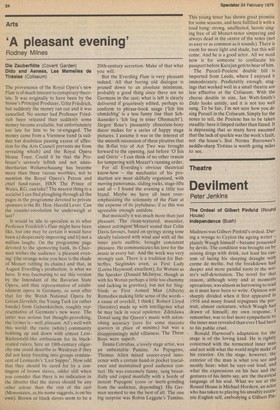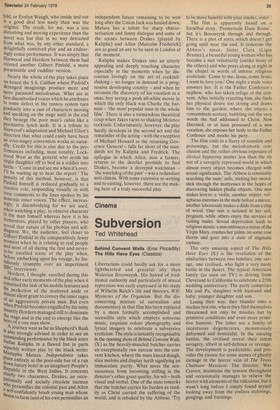Theatre
Devilment
Peter Jenkins
The Ordeal of Gilbert Pinfold (Round House) Independence (Bush)
Madness was Gilbert Pinfold's ordeal. During a voyage to Ceylon the ageing writer — plainly Waugh himself — became possessed by devils. The condition was brought on by mixing drugs with drink, not least his custom of lacing his sleeping draught with creme de methe, but the breakdown had deeper and more painful roots in the writer's self-detestation. The novel for that reason, although witty and at moments uproarious, was almost as harrowing to read as it must have been to write. Opinion was sharply divided when it first appeared In 1956 and many found repugnant the portrait, almost caricature, which Waugh had drawn of himself; my own response, I remember, was to feel more sympathetic to the inner man revealed than ever I had been to his public crust. Ronald Harwood's adaptation for the stage is of the loving kind. He is rightly concerned with the tormented inner marl and not with what the world might make of his exterior. On the stage, however, the exterior of the man is what you see and mostly hear: what he says out loud, and what the expressions on his face and the gestures of his limbs say, are the theatrical language of his soul. What we see at the Round House is Michael Hordern, an actor who has taken to playing his amiably eccentric English self, embodying a Gilbert Pin fold, or Evelyn Waugh, who inside and out IS a good deal less nasty than was the original. The result, for me, was a less disturbing and moving experience than the novel was but that in no way detracted from what was, by any other standard, a delightfully contrived play and an endearingly comic performance. It was simply that Harwood and Hordern between them had created another Gilbert Pinfold, a more presentable and cuddlier version.
Nearly the whole of the play takes place on board the S.S. Caliban where Pinfold's deranged imaginings produce more and more paranoid melodramas. What are at first disembodied voices which he attributes to some defect in the tannoy system turn gradually into a cast of characters moving and speaking on the stage until in the end they besiege the poor man's cabin like a Psychiatric lynch mob. It is a tribute to Harwood's adaptation and Michael Elliot's direction that what could easily have been an over-stagey convention works so naturally. Credit for this is also due to the performances including, most notably, Lockwood West as the general who sends his virgin daughter off to bed as a soldier into battle — 'Come in and see me when it's over. I'll be waiting up to hear the report.' The Penalty of this method, however, is that Pinfold himself is reduced gradually to a reactive role, responding visually or with terse comments to the lines spoken by his demonic inner voices. The effect, increasingly, is disembodying for we are used, When watching a play, to observe character in the man himself whereas here it is his tormentors, played by other players, who reveal that nature of his phobias and selfdisguest. We, the audience, feel closer to Gilbert Pinfold in the comparatively fewer moment when he is relating to real people and most of all during the first and neverto-be excelled scene of the play when, before embarking upon his voyage, he fastidiously triumphs over an impertinent 1313C interviewer. Hordern, I thought, excelled during this and other early moments of the play when it re.Mained the task of his mobile features and las perfection of the muttered aside or almost silent grunt to convey the inner rages of an aggressively private man. But even vv. hen Pinfold becomes engulfed by his noisy Insanity Hordern managed still to dominate lhe stage and in the end to emerge like the nero of a one man show.
A journey west as far as Shepherd's Bush la also strongly advised in order to see an 2utstanding performance by the black actor stefan Kalipha in a flawed but in parts suPerbly written play by the black writer Mustapha Matura. Independence takes 'Pdlace entirely at the pool-side bar of a run _own luxury hotel in an imaginary People's Ke.public in the West Indies. It concerns elao.fly two characters, Drakes, an occuPationally and socially obsolete barman Who Personifies the colonial past and Allen a, se.lf-confidently brash young man whose uesire to farm land of his own personifies an independent future remaining to be won long after the Union Jack was hauled down, Matura has a talent for sharp characterisation and funny dialogue and some of the scenes between Drakes (played by Kalipha) and Allen (Malcolm Frederick) are as good an any to be seen in London at the moment.
Kalipha makes Drakes into an utterly appealing and deeply touching character especially in the moments when he discourses lovingly on the art of cocktailshaking — no longer in demand in a progressive developing country — and when he recounts the discovery of his vocation as a smai. boy seeing a posh all-white movie in which the only black was Charlie the barman — 'the most popular man in the whole film'. There is also a tremendous theatrical coup when Jakes turns to shaking Molotov cocktails. Unfortunately, however, the play hardly develops in the second act and the remainder of the acting —with the exception of Michael Howard as the returning Governor General — falls far short of the standards set by Kalipha and Fredrick. The epilogue in which Allen, now a farmer, returns to the derelict poolside to find Drakes, become a decrepid watchman — 'the watchdog of the past' — was a redundant anti-climax. With some extensive re-writing and re-casting, however, there are the making here of a truly successful play.



































 Previous page
Previous page